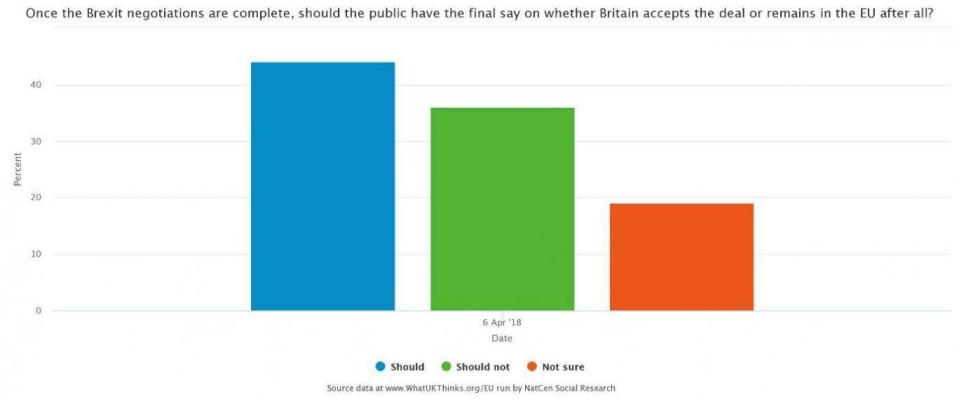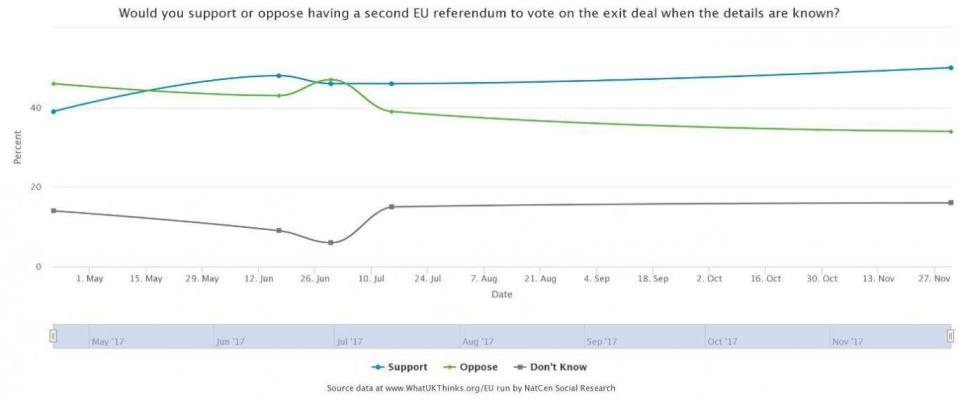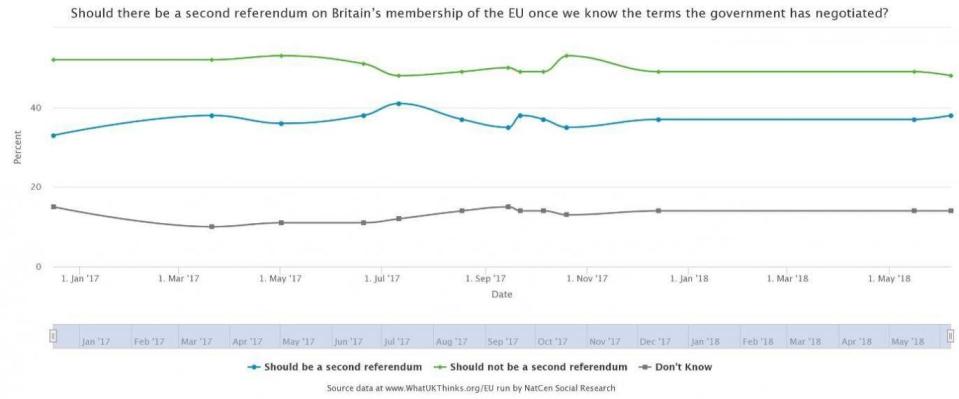Brexit: How the UK gradually warmed to a second referendum on leaving the EU
It is now two years since Britain’s vote to leave the European Union, and yet polling suggests the prospect of a second referendum looks closer than ever.
This year has seen a gradual shift in the debate, from talk of another plebiscite on EU membership to discussion of a fresh public vote on the terms of the UK’s final exit deal.
Both the Lib Dems and the Greens have made it their official policy to deliver such a referendum, and dozens of Labour MPs have broken ranks to throw their support behind it too.
Former prime ministers Tony Blair and Sir John Major have come out in favour of a public vote on the final deal, and groups such as Best for Britain and the People’s Vote, who have taken to the streets of London today, continue to campaign for voters to have the final say on Brexit.
But what about the rest of the country? Is Britain really in the mood for a second referendum, or are most citizens happy to wait and see where the first one takes us? A look at the data suggests the UK may finally be warming to the idea of a “people’s vote”.
A new Survation poll has shown that almost half of voters would support a second referendum on the final Brexit deal.
Of those polled, 48 per cent said they would support a second vote to “accept or reject the deal”, a quarter said they would oppose it, 18 per cent had no opinion, and 9 per cent were undecided.
With a 23-point margin between those in favour and those against, Survation’s latest poll gives us the largest ever majority in support of a second referendum.
Only a handful of polls to date have returned a majority in favour of a second public ballot, and the wording of such polls typically refers to a “final say” on the deal, rather than a “second referendum” – which has proven less popular with voters.
In April, for example, in the first ever poll to show majority support for a second vote, YouGov asked respondents: “Once the Brexit negotiations are complete, should the public have the final say on whether Britain accepts the deal or remains in the EU after all?”
As shown in the table below, 44 per cent of voters thought the public should have a “final say”, 36 per cent thought they should not, and 19 per cent were undecided.

Similarly, in two Opinium polls published in April and May respectively, respondents were asked: “To what extent do you support or oppose the public having a vote on the final deal that the government agrees with the EU?”
On average, 53 per cent of respondents said they would support giving the public a vote, 31 per cent said they would oppose it, and 17 per cent were undecided.
Clearly, there is now a growing body of evidence to suggest that voters are warming to the idea of a second referendum, but a look at the historical data offers reasons to be cautious.
Between April and December 2017, Survation conducted five polls which asked respondents: “Would you support or oppose having a second EU referendum to vote on the exit deal when the details are known?’”

As we can see, only three of those five polls returned a majority in favour of a second referendum.
On average, 46 per cent of respondents thought there should be a public vote on the final deal, 42 per cent thought there should not, and 12 per cent were undecided.
Survation’s polling may make for happy reading at Best for Britain and the People’s Vote, but it is also the least extensive and – up until Friday’s poll – the least up-to-date.
In contrast, Opinium has conducted 13 polls since December 2016 which asked respondents: “Should there be a second referendum on Britain’s membership of the EU once we know the terms the government has negotiated?”

As shown in the graphs, a majority of respondents have consistently rejected the idea of a second referendum on EU membership.
On average, exactly half of voters thought the public should not get a second chance, 36 per cent of voters thought they should, and 13 per cent were undecided.
The percentage of respondents who think there should be a second referendum on EU membership has increased over time, however, having narrowed the margin from 19 points in December 2016 to just 10 points this month.
One final dataset, based on polling from YouGov, tells a similar story.
Since April 2017, YouGov has conducted 11 polls which asked respondents: “Do you think there should be a second referendum to accept or reject the terms of Britain’s exit from the EU once they have been agreed?”

Once again, a majority of voters have consistently rejected a straight yes/no referendum on the deal.
On average, 45 per cent of voters thought the public should not get the final say, 31 per cent thought they should, and a fifth were undecided.
As in Opinium’s polling, the percentage of respondents who think there “should” be a referendum on the final deal has increased significantly over time. In YouGov’s polling, the margin between the “shoulds” and the “should nots” has narrowed from 17 points in April last year to just 8 points in May 2018.
To conclude, one reading of the data would suggest the public are slowly coming round to the idea of a second referendum, but it is still too early to say whether a “people’s vote” has clear and conclusive majority support.
This is likely because a high number of both Leave voters and Remain voters feel frustrated by the government’s handling of the Brexit negotiations, and both see a vote on the final deal as the best way to ensure the best of all possible Brexits – or no Brexit at all.
Survation’s latest poll appears to support this theory, as the breakdown of the 48 per cent of respondents who would support a second referendum included 35 per cent Leave voters and 66 per cent Remain voters.
Parliament would still take a great deal of convincing to vote in favour of a second referendum, however, and therein lies the greatest challenge for those hoping to see a “people’s vote”.
As things stand, however, there might just be something for everyone in a second referendum, so do not expect to have heard the last of it.

 Yahoo News
Yahoo News 